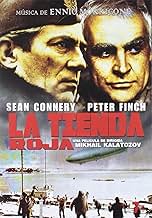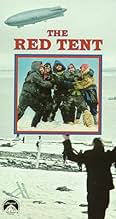Torn by personal guilt, Italian General Umberto Nobile reminisces about his failed 1928 Arctic expedition aboard the airship Italia.Torn by personal guilt, Italian General Umberto Nobile reminisces about his failed 1928 Arctic expedition aboard the airship Italia.Torn by personal guilt, Italian General Umberto Nobile reminisces about his failed 1928 Arctic expedition aboard the airship Italia.
- Awards
- 2 nominations
- Einar Lundborg
- (as Hardy Kruger)
- Renato Alessandrini
- (uncredited)
Storyline
Did you know
- TriviaSir Sean Connery, who received top billing, spent three weeks filming in Moscow. Peter Finch spent nine months on the production.
- GoofsDuring the final break up of the pack-ice, many shots are included that in fact depict the calving of icebergs at a glacier snout or edge of an ice-shelf. Pack-ice breaking up and icebergs calving are completely unlike each other visually - and, as physical phenomena, are entirely unrelated.
- Quotes
Aviator Lundborg: Men are risking their necks for fame, a medal, promotion, or money. What's wrong with money, mm? Just a means to happiness.
Roald Amundsen: But you don't look like a happy man, exactly. More like a man who's learned to be indifferent to unhappiness.
Aviator Lundborg: I'm glad you know it all, Mr. Amundsen.
Roald Amundsen: But you see, a man who is indifferent to his own unhappiness is indifferent to everything.
- Crazy creditsSome of the material for the Russian version listed the Scottish actor who plays Amundsen as "Sh. Konneri."
- Alternate versionsThe version released in the Soviet Union was significantly longer and featured an alternate score by composer Aleksandr Zatsepin instead of the score by Ennio Morricone used in the shorter European/American version.
- ConnectionsFeatured in A Film About Mikhail Kalatozov (2006)
This is Director Mikheil Kalatozishvili's tribute to Sergei Eisenstein, a disorienting yet organized montage of vast scale juxtaposed with claustrophobic confinement (its worth watching again just to focus on the scene transitions-the editing is brilliant). The scenes inside the dirigible and the red tent (the title character) are carefully cut into spectacular exterior shots of arctic landscapes and the dynamic energy of crowds in the Russian countryside and city.
There is a fusion of European expressionism with Hollywood realism in this film unlike anything I have ever seen before. This is possible because of the storytelling device of having everything unfold in flashbacks by the main character General Nobile (Peter Finch). Nobile was the organizer and commander of Italy's ill-fated attempt to reach the North Pole by dirigible. This generally true (certain historical liberties are taken to simplify things) story is told entirely from his point of view.
Forty years after the expedition Nobile is a disgraced figure living in Rome and burdened by guilt and sleeplessness. You learn that on sleepless nights he conjures up participants in the expedition fiasco (both members and rescuers), letting them judge him for his actions 40 years ago. These sessions have been largely inconclusive but this night he pulls out all stops and convenes a full trial in his living room-with almost all the central figures present. More importantly, for the first time he names the ruthless Lundborg (Hardy Kruger) as his prosecutor-a move that Lundborg assures him will mean that the jury will reach a verdict for the first time. These are not ghosts but rather figments of Nobile's imagination and they behave according to his perception of how they would behave.
This storytelling device allows the film to have its own commentary, making it not just an exciting adventure film with wonderful visuals, but an examination of the concept of leadership (much like "Command Decision", "A Gathering of Eagles", and "They Came to Cordura"). More importantly it becomes an allegorical study about free will and destiny, as careful planning and good judgment are just two factors in any complex operation; subject to luck and unforeseen events.
The many characters are a representative cross section of society; with heroes, opportunists, martinets, dreamers, and average Joes. Ultimately, things happen (both good and bad) not because of the challenge of man versus nature, but because of the placement and misplacement of human resources (i.e. the right or wrong person assigned to a particular role in the expedition and the rescue efforts).
From the events portrayed in the "The Rent Tent" it is difficult to fault Nobile as a leader. He wisely turns back to Kings Bay when the weather gets bad, he is genuinely devastated at the loss of some of his men, and his actions after the crash are all reasonable. He can be blamed for allowing Lundborg to bring him out before his men but under the circumstances it was a sensible decision if not a politically correct one. As Samoilovich, Captain of the Russian Icebreaker Krassin points out, a leader is judged by their actions, and their actions by their results, Nobile's early rescue is the reason the other surviving crewmen are ultimately rescued.
Nobile's fantasy trial eventually dredges from his subconscious the realization of why he choose to leave with Lundborg (1000 reasons to stay-1001 to leave). That such a trivial and self-indulgent reason was the difference maker accounts for his continuing guilt. This realization, along with the belief that Amundsen (his peer) is the only one fit to judge him, allows Nobile to finally forgive himself for being human. They go out with Amundsen's advice to reflect not on their failures but on the things they attempted and the wondrous things they saw. There is no guilt in not achieving an ambitious goal, making the attempt is more important than succeeding.
The music is also great.
Then again, what do I know? I'm only a child.
- aimless-46
- Sep 10, 2006
- Permalink
- How long is The Red Tent?Powered by Alexa
Details
Box office
- Budget
- $10,000,000 (estimated)
- Runtime2 hours 38 minutes
- Aspect ratio
- 2.20 : 1
Contribute to this page







































